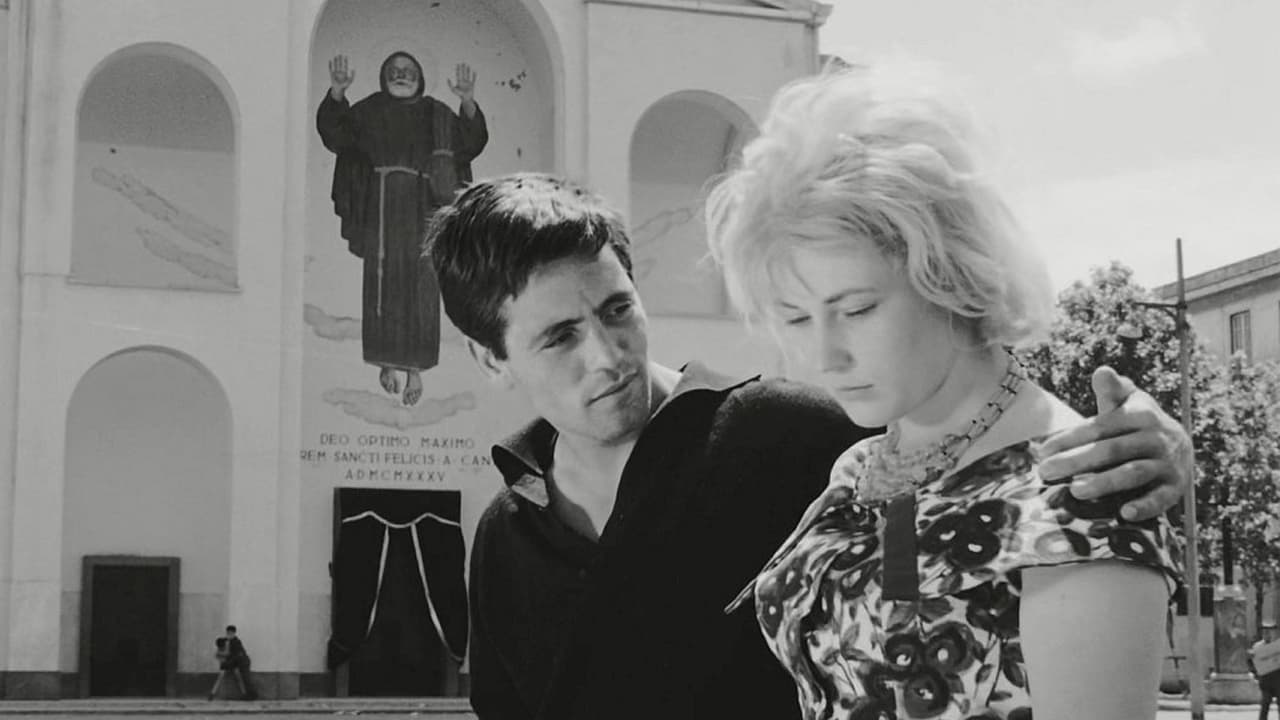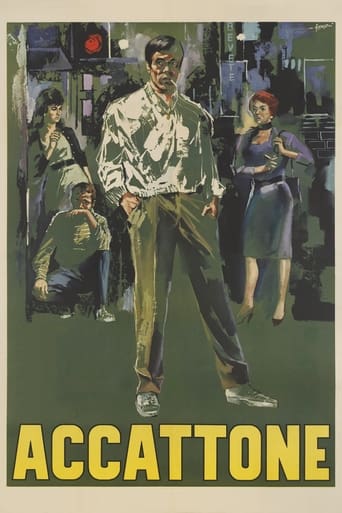

Tied for the best movie I have ever seen
... View MoreThis movie is the proof that the world is becoming a sick and dumb place
... View MoreBoring
... View MoreIn truth, there is barely enough story here to make a film.
... View MoreThis is not the Rome you see on Contiki. Pasolini has conjured up the half-life of the streets in this extraordinary movie. Accatone is a pimp and an idler, his friends are no better, and they walk Rome's emptiest streets night and day doing nothing much at all. Pasolini captures their aimless existence with his artless cinematography. Most of the dialogue is shot close up, and the cast deliver their lines with character and simplicity. It is perhaps their authenticity that makes them charming. Even Accatone is charming, despite his selfishness, idleness, resentment and occasional misogyny. They all need to be charming. In the bleak world of this movie, irony is the only defence against madness. There are moments of happiness that break through, and prevent the film from becoming monotonous or unrealistic. The beach scene near the start, and the later conversations between the tough and self-confident prostitutes, are scenes in which irony breaks out into humour, and defiance momentarily turns to content."The world will kill me, or I'll kill it!" exclaims Accatone. He struggles for redemption— but I won't spoil the end of the movie.
... View MoreThis just might be the greatest movie I've ever seen. There are two key elements here: the first is Pasolini's genius. Martin Scorcese, or however his name is spelt, is, was, and always will be the poor mans poor mans poor mans Pasolini. Pasolini's subtleness, his understanding of human nature... where does one stop? The second incredible element is that Citti is LANGUID CHARISMA personified. I used to think Jimmy Coburn was the king of such effortless charisma, but I've never seen a performance like this in my life. And I believe the cast were all pretty much amateurs also.Bach's genius is used hauntingly, in many ways this provides a link to his movie on Our Lord. This is just too beautiful a movie experience for words. I joined IMDb today solely to comment on what I consider to the worst movie I ever saw, two nights ago, called 'love actually'. Well, Accattone is probably the best.
... View MoreAccattone announces a director, Pier Paolo Pasolini, who is a haunting/haunted poet from his surroundings and realist, someone who wants to put his eye on the world without flinching on the details of how 'ordinary' (of the street) people speak and interact, how raw and uninhibited they can be, these being the guys on the streets who are vulgar and coarse at best and at worst are abusers of women. But at the same time what one comes away with is poetry in documentary form - it's another level of neo-realism, a little more like an urban story than a post-war treatise that still throbs with the importance of those in poverty. Anytime I hear the song Matthaus Passion I'll immediately contemplate those harsh images of Vittorio Accattone, being cast aside by his family for being a pimp, or that poor girl being beaten at night by that gang of men, which is something that elevates such hard scenes into art.Vittorio Accattone is the main character- charming and attractive, and also a perpetual scoundrel who also is a total outcast. He has a wife and kid(s), but is estranged from them by choice - her choice most likely - and he finds himself in big trouble once his main prostitute, Maddalena, is sent to prison for a bad informing job. It's after this we see Accatone on his potential path to redemption when he meets a supremely sweet and average girl from out of town, Stella, who he may eye as a new girl on the street... or perhaps not, as his attachment to her grows more and stronger, in spite of what and who are around him every day and night in the dirty province.He's someone we want to root for in being a better person, or, perhaps even, better at what he does. He's a tragic anti-hero in a New-Wave sort of sense, cool looking and aspiring to be modern and cool (and maybe he is, up to a point), but also poor and uneducated, so much so that being on the fringe and being called "PIMP!" is what he's been reduced to by default. The performance from Franco Citti is one thing that keeps the viewer locked in: he's so good here because he looks plucked right off the street by Pasolini, as would turn to be his method with choosing most of his 'actors' on camera. There's a reality to his interactions with his friends (so called) or his business associates. Some of their dialog and tones of speech aren't refined or look trained. At one point when Citti's Vittorio breaks down in tears- a sudden turn from a previous scene showing more attitude- is authentic, even as another actor could have possibly played it "better".It is what Pasolini wants, and he gets it, much in the same way he also gets a view of this side of Rome in a way that hasn't been seen before up until this time. His DP Tonino Delli Colli shoots simply often, and sometimes not so much - there's complexity, say, to a tracking shot in front of Accatone talking to a girl who is on a bicycle, or when we see the horrorshow of the men taking Maddalena at night in the middle of nowhere, the only lights starkly coming from the car. The effect is nothing short of a slow-burn. While a few of the actors do fall a bit too flat, and some scenes come close to lagging around (the editing might be the most significant flaw here), the raw emotion and fire in the subject matter keeps things fascinating. You want to see what happens with this young guy, and it's his tragedy that gets us absorbed, even as the Bach music abstracts the sorrow, and agonizing poetry of the streets, and it's this that makes it a classic.Only downside I must mention - if you live in the US, or happen to watch it on a DVD or online from Walter Bearer films, the print is just not very good. It's the sort where the white subtitles drop in and out of view depending on who's standing where in a frame. It's not totally detrimental, but some scenes become hard to follow due to the poor quality of the subtitles with the print. This, if for no other reason, demands the film receive the Criteron treatment.
... View More"Accattone" was Pasolini's first film. Besides his huge engagement for the under-privileged, we have already here practically all motives that go like a "fil rouge" through Pasolini's whole work: The use of dialects and generally linguistic substandard instead of the literary language, the decision for the suburbs instead of the city, the atheist world in concurrence with a very often negative Catholic substrate, the mavericks who live at the edges of society in comparison to a bourgeoisie that turns out to be fascist in Pasolini's Marxist interpretation, and possibly also Pasolini's imperturbable belief in educating the uneducated, the illiterate, the so-called scum of society. (It is a more than tragic fact that while Pasolini in his real life even went so far as to have lectures in the slums in the front of an audience that could not understand him, he finally got a victim from exactly the same people who did accept him as he accepted them."Accattone" is the story about a wasted, senseless and hopeless life. The title-hero leaves his wife and children in order to become a pimp. With his colleagues he spends his days drinking, gambling, betting. He does not mind to send back to street-walking his severely hurt prime-whore "Maddalena". In the night he dreams that he is dead and forbidden to attend his own funeral. On the other side, he squeals on his friends for a plate of pasta. For a short time there is light in Accatone's dark life: He meets Stella, the "star", and spoils her with gifts that he pays from the money of items robbed from his own son. However - and here we have a "prodromus"-motive from "Mamma Roma" - Accattone learns that Stella, too, was a whore once. So he forces her to street-walking, too. But he forgot Maddalena while she had not forgotten what he had done to her. When she hears from Accattones new luck, she gives the police a tip. Now they can observe him and his gang during a major robbery. Before they catch him, he tries to flee, but dies by driving with full-speed into a truck. While he lies dying at a curb of the street, one of his colleagues makes the cross-sign with handcuffed arms. Accattonne - the "Anti-Christ" or better "Counter-Christ" in the word's most original sense. Pasolini himself wrote: "I wish that only very few people will see in the crossing at the end a sign of hope".
... View More